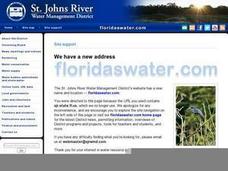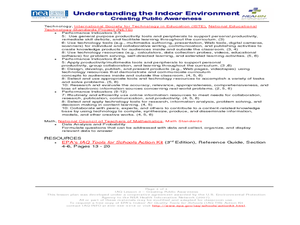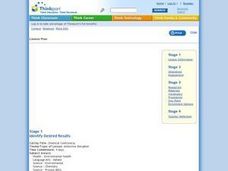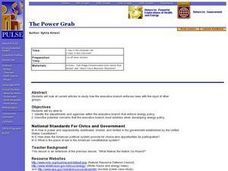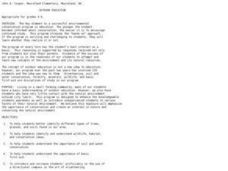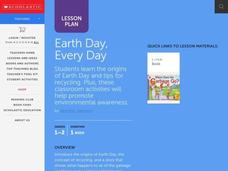Curated OER
Lesson 11 - Potable Water
Students investigate the meaning of potable water and water reuse. They define water quality and quantity problems. They complete worksheets, a quiz and design a poster.
Curated OER
Creating Public Awareness - Indoor Air Quality
Students design a poster about indoor air quality. In this indoor air quality lesson plan, students make a billboard that tells the occupants of a building about at least one air quality problem.
Curated OER
Movement of Air Mind Map Activity
Students explore the movement of air. In this air activity, students discuss and give examples of air ventilation. Students compare outdoor and indoor air quality. Students create mind maps as a visual representation of...
Curated OER
Indoor Air Quality
Young scholars make a work puzzle using air quality vocabulary. In this air quality vocabulary lesson, students design a word puzzle using a teacher designated number of vocabulary words. They peer edit the puzzles with their classmates.
Curated OER
Service Projects in the Dominican Republic
High schoolers read primary source documents and identify several kinds of service projects conducted by Peace Corps Volunteers; young scholars identify criteria used by the Peace Corps for conducting service projects for the common good.
Curated OER
Service Projects in the Dominican Republic
Students look into how Peace Corps Volunteers have provided community assistance in the Dominican Republic. They read primary source documents and be able to identify several kinds of service projects conducted by Peace Corps Volunteers.
Curated OER
Going in Cycles: The Life of an Aluminum Can
Students explore the life cycle of aluminum cans. In this recycling lesson, students review the manufacturing process and how to make a closed loop cycle. Students also have the opportunity to present what they've learned to others...
Curated OER
Selecting Trees for Urban Environments
Learners consider the best place to plant a tree. In this environment instructional activity, students identify urban locations that are compatible with particular tree types. Learners decide what trees would go where and why they would...
Curated OER
Who Dirtied the Water?
Students develop a greater understanding and concern for the plight of our coastal waterways. Students begin to recognize that we are all partially responsible for water pollution.
Curated OER
Chemical Controversy
Students explore the endocrine disruption theory. They work in groups to research and develop a persuasive oral argument to support one side of the endocrine disruption theory. Students engage in debate and other activities to analyze...
Curated OER
Waves
Students identify the different parts of a wave. In this physics lesson, students explain how animals communicate using sound waves. They discuss the effect of Navy's sonar on dolphins and whales.
Curated OER
Caps for Sale/Color Words
Students read the book "Caps for Sale." Students model reading a sentence and using one color cap and the color word (written in its color). They match the color word (written in its color) to the correct color hat.
Curated OER
Million Dollar Machine
Students explore their self-awareness. They discuss the words unique, extraordinary and irreplaceable and their strengths and weaknesses. They write five things their bodies or Million Dollar Machines can do and investigate their blood...
Curated OER
And the Rains Came Down: A South American Rainforest
Learners examine the characteristics of a South American tropical rainforest. They analyze maps, develop graphs, listen to the book, The Great Kapok Tree, and create a rainforest mural.
Curated OER
Government: The Power Grab
Learners are able to identify the departments and agencies within the executive branch that enforce energy policy. They are able to describe potential concerns that the executive branch must address when developing energy policy.
Curated OER
Outdoor Education
Students increase their awareness of their natural environment. They engage in activities which emphasize the importance of conservation and create an interest in nature and conserving the natural environment.
Curated OER
Don't Use it All Up
Students observe the way that a sponge absorbs liquids and discuss how we our use of natural resources affects the environment around us. They discuss the need to conserve resources so we don't run out of what we need.
Curated OER
What are Properties of Wood?
Students use hands on scientific observation to determine characteristics of wood. They work directly with the materials and record their observations. Students test if wood absorbs water, if wood floats or sinks, and if all wood...
Curated OER
Tree Friends
Learners are introduced to tree structure and use. They identify their special tree using all senses except sight. Students identify six different internal parts within a cross section of tree trunk (bark, phloem, xylem, cambium,...
Curated OER
Earth Day, Every Day
First graders celebrate Earth Day. In this Earth Day lesson, 1st graders listen to a book Where Does the Garbage Go? by Paul Showers, and list facts about the garbage we throw away. Students use the Think-Pair-Share method.
Curated OER
What is Wrong with My Pond?
Students examine various pond water samples to identify water quality. In this water quality lesson, students will identify levels of nitrates, ammonia, pH, hardness,and alkalinity in pond water. They will explain importance of water...
Curated OER
Science Under Control
Students investigate and assess scientific issues for which government regulation has been or might be enacted. Using their research, students write letters to lawmakers supporting or contesting related legislative efforts.
Curated OER
Earth Day
Students participate in activities to make them aware of Earth Day and its significance, and how they can make a difference in saving the environment.
Curated OER
When Disaster Strikes
Young scholars examine the ways major industries are affected by and respond to natural disaster. They interview local representatives of these industries on how they prepare for and manage such disasters.
